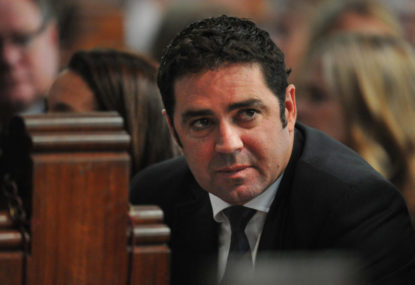Not everyone who suffers from depression shags their best mate’s wife, shoots an elephant, king-hits a stranger, drink drives or gropes women in nightclubs, despite how mental illness is still portrayed.
Nor are all current or former footballers outstanding human beings. In fact, some you wouldn’t trust with your poodle, partner or pay cheque.
Anyone following the recent saga of former AFL stars and best mates Garry Lyon and Billy Brownless could be mistaken for thinking that there is a new mental illness to be added to the Diagnostic and Statistical Manual of Mental Disorders.
More:
Mental illness is not football
How far we have to go on mental illness
That of, being caught. Often, only when a misdemeanour of one form or another is exposed is the spectre of mental illness raised.
Sadly, or perhaps conveniently, this phenomenon seems to occur commonly among celebrities. Whether responsibility for this falls at the feet of spin doctors, journalists or sufferers, I don’t know.
What I do know is that it gives the rest of us who do, or have suffered, from mental illnesses a bad name. Depression isn’t a prerequisite for horizontally folk dancing with your best mate’s wife, notwithstanding that being caught might trigger it.
The sensational approach to coverage of mental illness reinforces outdated prejudices and encourages consumers of media to automatically associate mental illness with being a dickhead, crime and/or immorality.
We’ve already been successfully schooled in playing a variation of this word association game over the past 15 years ago with ‘Muslim’ and ‘terrorism’ now often viewed as being one and the same thing.
No matter how eagerly professional sporting organisations attach themselves to worthy causes, time and time again this year already we’ve seen that they are not fit to educate anyone about mental illness, sexism, alcohol abuse, racism, drugs, homophobia or anything much else, beyond throwing, catching and kicking. They excel at providing politically correct lip service and a ‘do as I say, not as I did’ behavioural model.
The reason we so often hear, ‘He was the last person I would have expected to do that,’ when told that someone, who was not Superman, has leapt from a tall building is because the vast majority of people who suffer from a mental illness, do so either in silence or very quietly.
If I were to tell people that throughout the course of my life I’ve suffered from major depression, a bipolar disorder, panic attacks, trichotillomania, bulimia, self-harming tendencies, suicidal thoughts, encopresis and anxiety, many wouldn’t even know what most of them were let alone that I’d experienced them.
Why would anyone volunteer such information when the perception of mental illness, while improving, often remains as that of a shoeless whacko talking gibberish to a rubbish bin (an audible version of Twitter)?
People were suspicious about AFL player Lance Franklin’s admittance of a mental illness last year. Would they have been so unkind about a cancer diagnosis or a nose transplant? He wasn’t caught destroying a grand piano, so the veracity of his mental illness was questioned. Just because something is invisible, it doesn’t mean it’s not there.
Garry Lyon lives in a bubble. I can’t imagine anything less real than television. I met Ita Buttrose on New Year’s Eve while walking the dog and even she called it, ‘the idiot box’.
My actual experience of the medium – outside of watching it – is a three-second appearance on the ABC program Country Wide while picking up acorns on a Canberra nature strip in 1978, so I’m not qualified to comment on the inner workings of the industry.
But, unfortunately I have seen reality television so know that some spectacularly talentless and unhinged egomaniacs are given a platform to preach from. I’ve also seen egos run amok, remaining unchecked in football clubs, workplaces and comedy clubs, the stars surrounded by sycophants. Normal societal behavioural standards don’t apply to the talented. They think they can do anything. Often they try to.
Mental illness is separate to and different from that. It can afflict a television star, a stay-at-home parent, a war veteran or a public servant. It doesn’t discriminate.
In some ways, you’re lucky if you have a mental illness as it can usually be treated. As yet, there is no known treatment for being an arsehole.
I’ve always thought that the more homophobes who have gay children the better. Now, I also believe that the more people who have a bout of mental illness the better. Nothing too serious – mental illness-lite perhaps – but enough for people to appreciate how terrifyingly awful and debilitating it is.
And benefits usually come from treated mental illness. If nothing else, you’ll learn humility and empathy for others. I’m a better person having recovered from a lifelong battle only seven years ago.
So remember, not everyone who has a mental illness acts like a weirdo or does something stupid. If they did, Shane Warne would have all the excuses in the world.





























































































